Zorro
Héctor Armienta (Music & Libretto)
Opera San José
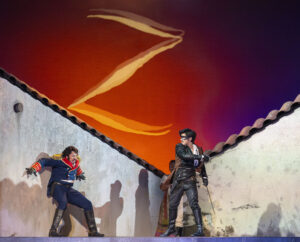
A pulp fiction novel written in 1919 by John McCulley was so popular that he wrote dozens more short stories for decades about its hero. Within a year of McCulley’s publication, Douglas Fairbanks starred in a swashbuckling silent film whose popularity helped spawn to-date more than 40 more films, ten TV series, and an untold number of comic book titles. And now, the romantic, justice-seeking hero whose sword-slashing “Z” is still recognizable worldwide becomes the star ready to wow Opera San Jose audiences as the company presents the Northern California premiere of Héctor Armienta’s new opera, Zorro — a must-see production replenish with rousing, heart-throbbing music; electrifying vocals; swooning romance; and thrilling action.
The story that emerges so riveting as portrayed onstage is not just one of comic book fiction; it is an important history of California that was known in the early 1800s as “Nueva España,” New Spain. In this period, both in the mother country and in the new world, injustice reigned down upon the poor, especially in the Americas on those peoples indigenous and of mixed race.
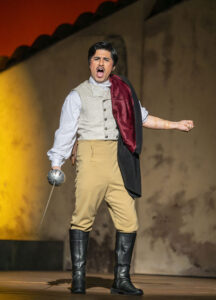
The son of a Spanish landowner in the pueblo of Reina de Los Angeles, Diego de la Vega, returns from Toledo, Spain where he has been been schooled and inducted into the sacred and secret Order of Zazueta. Trained in swordsmanship and receiving a carved “Z” on his arm, he is given the charge by his mentor to carry the dream for a free Spain to the new world.
But the happy, childhood life in the New Spain he left has drastically changed as we learn in an early scene where the townspeople (a much-accomplished Chorus of sixteen) sing in beautifully melodic but haunting lines, “For my poor people, another day of pain … We are the lost, the forgotten … They take our land … our food … and call us ‘the poor’.”
The young and handsome Diego quickly has two monumental reunions: one with his former lover, Carlota, who still very much loves him, and one with Ana Maria, who was taken in by his father as a young girl after her parents were killed and raised alongside Diego under the watchful eyes of their nanny, Toypurina. Both women will play major roles in helping transform Diego from the carefree youth he once was into the man he must become.
Carlota takes Diego to meet the new mayor of the pueblo, General Moncada — a surprise encounter between two former best friends in the Academy in Spain who had a falling out when Moncada supported a revolution to usurp the king that held Diego’s loyalty. Diego’s unease with his former comrade proves to be well-founded when we soon witness Eugene Brancoveanu voice in deeply rich and rippling baritone Moncada’s resolve to return New Spain to “the natural order of things,” where a caste system is to be forced on the native population, where “they will learn their proper place.” Scenes of soldiers beating and killing resisting locals begin to pepper the distressing, unfolding series of events.
When Diego first arrives to the home from which his recently deceased father once sent him away and one to which he had pledged never to return, Xavier Prado sings in beautifully intoned tenor notes, “Father, I returned; tell me if I am the man you wanted me to become.” Meeting later Ana Maria outside the town’s chapel as she feeds the poor, she tells him that like those poor, “My kind is not welcomed here.”
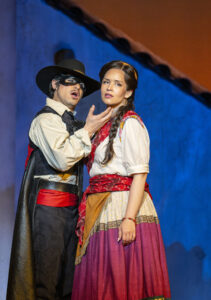
With lyrically pure, strikingly alert soprano notes, Maria Brea’s Ana Maria implores Diego to remember the words of his father: “Be the star that vanquishes the darkness … the light that fills the sky.” But Diego — now love-smitten by this once-girl, now woman — suggests that they need together to escape the evil now overtaking their homeland, “to find a safe place and start anew.”
Defiantly with a voice that rings with pure conviction, Ana Maria sings her abrupt response, “I can’t leave … I am here to fight for freedom.” She also reminds him of something they both as children once heard, “A man without passion is not a man.” In an equally gorgeous voice with its own blasting, stubborn edge, Diego replies, “Enough with my father’s sayings;” and the two part both disagreeing but in love and unsure what the other will do next.
Ana Maria’s bravery and defiance against the atrocities of the evil Moncada eventually make her a target of his rage, but not before other innocent victims have led Diego to take her and his father’s words to heart and to emerge as the masked man soon to be known to all as Zorro. His final resolve for action comes from a revelation by his Nana, Toypurina.
Mezzo-soprano Deborah Martínez Rosengaus sings with much depth and emotion the story how Diego’s father was murdered by Moncada because of his stand for justice for the native poor. Toypurina presents Diego with a sword his father made for him, singing with stirring notes its inscription, “Justice has no color and causes no pain.” The sword now becomes Zorro’s weapon of justice and his means for marking the famous “Z.“
Just as Diego has a turn of heart and decides he must join Ana Maria and the people of the town to fight against the mounting tyranny, Diego’s ex, Carlota, more and more begins to understand her own role to ensure justice. Melisa Bonetti Luna is nothing short of stunning in the role of the woman who still aches in her love for Diego but who makes courageous choices to protect the woman he now loves instead of her. With a mezzo-soprano voice that time and again is arresting in notes that express a yearning for love she will never again receive, Carlota sings with heart-rendering resolve, “For love you give in, you let go … [you] give without regret.” Among a cast of stellar performances, Melisa Bonetti Luna leaves an inspiring, heart-breaking impression long to be remembered.
But along with the compelling and gripping stories of romance and justice comes also some fun and much eye-popping swishing and swatting of swordplay. Like Shakespeare, Héctor Armienta has generously inserted into the serious an oft-hilarious and always likable character guaranteed to please. Jesús Vicente Murillo is Gomez, a clownish sergeant of Moncada whose vibrant, vigorous bass-baritone reacts with a bit of rolled-eye impishness to the General’s repeated commands of “knock before you enter my office.”
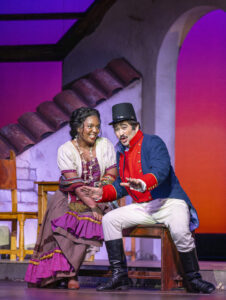
Gomez’s heart finds its own romantic target in one of the town’s maidens, Luisa (Arianna Rodriguez), who sports singularly splendid soprano vocals that reflect the kind of spunkiness and vivacity she shows in her eyes, her flirting, and her whole persona. Together, they elicit huge audience response as they joyfully sing and dance, dreaming about their one day being rich enough for him to have boots that actually hide his toes and for her to have a dress of gold. Their crowning pose mimics hilariously Grant Wood’s “American Gothic” painting with her broom proudly clasped between them.
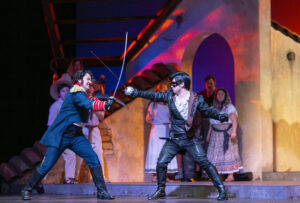
And as to the clashing and clinking of swords, kudos to Dave Maier as fight coordinator and to a cast including Zorro, Moncada, uniformed soldiers, and even Ana Maria who more than meet audience expectations for a thrilling display of realistic dueling (with Zorro of course often taking on several attackers at once). In front of the village’s adobe buildings and on their slanted roofs the swords clash, an impressive re-creation of early Los Angeles designed by Liliana Duque-Piñeiro and populated with properties ranging from the villagers’ crops to their tools that become weapons as designed by Lori Sheper-Kesel. Ulises Alcala’s spectacular array of period costumes range from those rich in tradition proudly worn by the poor and those steeped in both Mexican and European influences worn by the land-rich, moneyed class. Completing the scenic glimpses of what life, land, and sky once looked in early California history is the artistically dazzling lighting design of Tláloc Lopez-Watermann in which colors rich, shadows patterned, and light of sun’s brilliance are on display.
But what is most important for any opera is of course the music; and in that respect the voices of this cast and chorus and the instruments of the orchestra (Jorge Parodi, conductor) reign supreme in bringing Héctor Armienta’s score to life. The composer’s music is a tribute to its Spanish roots with sounds of Latin folk ballads (corridos), traditional love songs (boleros), and heart-pounding dance music (flamenco) threading throughout. Along with the array of instruments one would expect from a large orchestra as accomplished as Opera San Jose’s, the guitar plays a special role in this music, as played so emotionally and exceptionally by Eric Wang. A short bulería the opera’s composer co-wrote with the renowned flamenco guitarist, Adam del Monte, is a memorable highlight of the evening.
Whether an aficionado of Puccini, an admirer of Latin songs, or a fan of adventurous tales, Opera San Jose’s eye-popping, heart-pumping Zorro by Héctor Armienta is an evening not to be missed.
Rating: 5 E, MUST-SEE
A Theatre Eddy’s Best Bet Production
Zorro continues through May 4, 2025 in a two-hour, thirty-minute production (with intermission) by Opera San Jose at the California Theatre, 345 1st Street, San Jose, CA. Tickets are available online at www.operasj.org or by phone at 408-437-4450, 10 a.m. – 4 p.m., Monday – Friday.
Photo Credits: David Allen

It must have been thrilling to watch. Wishing I had been there..